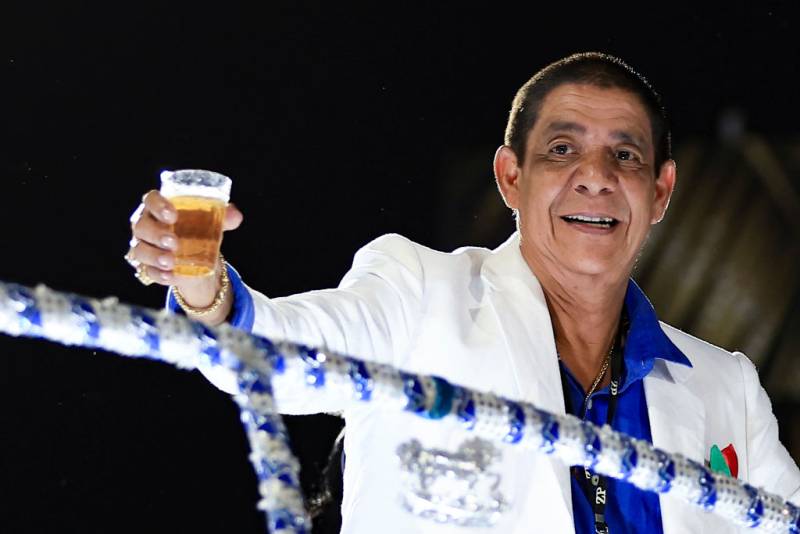A famously fecund ensemble that’s shaped major composers and improvisers for decades, Pascoal’s group has been anchored since 1977 by bassist Itiberê Zwarg (a formidable bandleader and composer himself). As much a family as a band, the sextet includes Hermeto’s son, the percussionist, soprano saxophonist and producer Fabio Pascoal, who came on board in 1987, and drummer Ajurinã Zwarg, the son of bassist Itiberê. Pianist André Marques was 18 when he jumped into the Pascoal pool two decades ago, and saxophonist and flutist Jota P. has been in the group for more than a decade.
“I look for musicians that are very highly trained, very skillful, with fast fingers and a lot of education,” Pascoal said on a recent video call, speaking in Portuguese, and emphasizing the importance he places on spontaneity. “They need a base before, but when you join, you can be very loose. Whoever walks a fixed line is a train. It’s universal music. My music is like the wind. It comes, passes through you, and causes a sensation and won’t come again. The next time it’s going to be different.”
Known with reverence and affection in Brazil as “O Bruxo” (The Sorcerer), Pascoal was a revolutionary figure in Brazilian instrumental music in the mid-1960s, profoundly shaping the post-bossa nova landscape via recordings with rising stars Elis Regina, Edu Lobo, and Cesar Camargo Mariano. His influence expanded via a series of groups with percussionist Airto Moreira, and he became a sensation in 1970 when Airto brought him into Miles Davis’s volatile electric band, a relationship documented on the album Live-Evil, which includes Pascoal’s tunes “Nem um Talvez” (Not Even A Maybe) and “Igrejinha” (Little Church).
Back in Brazil, Pascoal cultivated a verdantly rich musical world combining jazz, rock and contemporary classical music with Brazilian styles like frevo and samba, xaxado and forró. His closest associate in the Bay Area is Rio de Janeiro-born vocalist, pianist, composer and percussionist Claudia Villela, who’s been based in the Santa Cruz area since the mid-1980s. The last time Pascoal performed in California, he brought Villela on stage at the SFJAZZ Center and hailed her as a fellow sonic adventurer. She performs with her group at Kuumbwa June 26.
“I shortened my trip coming back because I want to catch him at Kuumbwa,” Villela said recently via video call from Rio, where she was performing with the great composer and guitarist Guinga. “I wouldn’t do for anybody else. Hermeto embodies the whole gestalt. An amalgam of everything Brazilian and beyond, every sound starting to make sense and connecting.”
If Pascoal embodies the experimental ethos in Brazilian jazz, then Zeca Pagodinho is the people’s choice — a samba superstar with a four-decade career making hits that speak to the lives of struggling and aspiring Brazilians. On his only Bay Area date, he plays the UC Theatre on June 3, one of only six U.S. shows on his schedule. As a songwriter, he’s the patriarch of pagode, a propulsive style of samba that emerged in early ’80s Rio characterized by the sharp sound of four-string banjo. He’s been turning out popular albums ever since.
“He came from a very violent area of Rio and never forgot his origins,” said Villela in explaining Pagodinho’s intense bond with the Brazilian people. “He still translates the existence of workers. His humor is a little sarcastic. His ‘paintings’ of the favelas are very artistic. He’s another face of Brazil, and speaks to a great majority. Even people who love a little bit more sophisticated music, who identify with Hermeto, they love Zeca too. He’s integral, very Carioca.”
In a similar way, guitarist Lulu Santos represents progressive Brazilian rock. A prolific and popular figure since the early 1980s, he ends a rare U.S. tour May 28 at the UC Theatre. Working closely with lyricist Nelson Motta, he recorded a series of hits “combining pop aesthetics and philosophy, talking about surfers and Buddhism,” Villela said. He broke new ground when he came out, managing to maintain his pop star status with a gay identity. “It was a big deal, because Brazil is such a macho country,” Villela said. “He was very candid. He’s still very loved, the same as Zeca, reaching across all strata.”
No Brazilian band is more inextricably linked to a particular moment than Os Mutantes, who emerged from São Paulo as teenagers in 1966 to spearhead the hugely influential but short-lived art movement known as Tropicalia (along with fellow Paulista Tom Zé and Gilberto Gil, Caetano Veloso, and Gal Costa, all from Salvador de Bahia). Created by Rita Lee and the brothers Arnaldo Baptista and Sérgio Dias, the band created a sound steeped in psychedelia and acid rock, combining a gleefully absurdist sense of humor, outrageous costumes and cagey use of musical pastiche. After decades of dormancy, the group reunited in the mid-aughts, and the incarnation playing at The Chapel on May 27 features only one original member, Sérgio Dias.
The group’s legacy received a burst of attention with the death on May 8 of Lee, who was thrown out of Mutantes in 1972 and went on to became Brazil’s biggest female rock star. A proud leftist, she hailed from an American family that fled the confederacy after the Civil War looking for a country that permitted slavery. (Brazil became the last country in the Americas to end de jure slavery, in 1888.) In Mutantes and as a solo artist, Lee was a champion of freedom, facing off against the military government.
“Mutantes were very important, with that pantomime and circus, the new aesthetics, some Brazilian rhythm and a little Beatles,” Villela said. “The hook of the whole thing was Rita Lee. Her ability to get right to the heart of the matter with her lyrics. In the ’60s, she sang with a bridal dress, pregnant, totally against the grain. They were a big piece of the kaleidoscope.”


